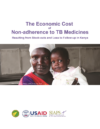
One of the key elements of successful tuberculosis (TB) control programs is adherence to treatment, which is a cornerstone of most international and national policies and guidelines. Non-adherence results in increased length and severity of illness, death, disease transmission, and drug resistance. Treatment interruption is often due to patient-related factors—classed as loss to follow-up (LTFU)—but can also be a result of provider issues, such as stock-outs of medicines. The purpose of this study was to estimate the morbidity, mortality, and economic impact of TB treatment interruption due to stock-outs and LTFU. The results are expected to help promote the benefits of ensuring the availability of good quality medicines and of undertaking interventions to reduce LTFU.
For the research summary, please follow this link.
- The Economic Cost of Non-adherence to TB Medicines Resulting from Stock-outs and Loss to Follow-up in Kenya — View | Download


